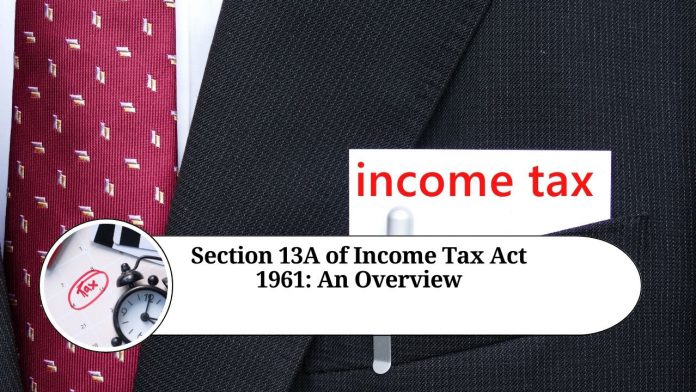Introduction
Section 13A of the Income Tax Act, 1961, deals with the taxation of income received by a person who is a member of Parliament or a member of a Legislative Assembly or Legislative Council. This section specifies the provisions for the calculation of such income and the deductions that can be claimed by the person. In this blog, we will discuss the provisions of Section 13A of the Income Tax Act, 1961, in detail.
Who is covered under Section 13A?
Section 13A covers two categories of people – members of Parliament and members of Legislative Assemblies or Councils. These individuals may be elected or nominated members of their respective houses.
Taxable Income
Under Section 13A, the taxable income of a member of Parliament or a member of a Legislative Assembly or Legislative Council is the sum of the following:
- The daily allowance received by the member for attending the Parliament or the State Legislature.
- The salary and any other allowances paid to the member by the government or the State Legislature.
- Any other income earned by the member during the financial year.
Deductions
A member of Parliament or a member of a Legislative Assembly or Legislative Council can claim deductions under Section 13A. These deductions include the following:
- Any expenses incurred by the member in the performance of their duties. This includes expenses such as travel expenses, office expenses, and communication expenses.
- Any interest paid on loans taken by the member for the purpose of constructing or purchasing a residential property.
- Any other deductions allowed under the Income Tax Act, 1961.
Tax Liability
The tax liability of a member of Parliament or a member of a Legislative Assembly or Legislative Council is calculated based on the taxable income as per the provisions of Section 13A. The member is required to file their income tax returns as per the due date specified by the Income Tax Department.
Penalty for Non-Compliance
If a member of Parliament or a member of a Legislative Assembly or Legislative Council fails to file their income tax returns on time or fails to pay the taxes due, they may be subject to penalties and fines as per the provisions of the Income Tax Act, 1961.
Benefits of Section 13A
Section 13A provides certain benefits to members of Parliament and Legislative Assemblies or Councils. For instance, the daily allowance paid to them is exempt from tax. Additionally, they are allowed to claim certain deductions that are not available to other taxpayers.
One of the major benefits of Section 13A is that it provides clarity on the taxation of the income earned by these individuals. It ensures that the tax liability is calculated in a fair and transparent manner.
Compliance with Section 13A
It is important for members of Parliament and Legislative Assemblies or Councils to comply with the provisions of Section 13A. They should ensure that they maintain proper records of their income and expenses and file their income tax returns on time.
In case of any doubts or queries regarding the taxation of their income, they can seek the help of a qualified tax professional. This will help them to avoid any penalties or fines for non-compliance.
Conclusion
Section 13A of the Income Tax Act, 1961, provides the provisions for the taxation of income earned by members of Parliament and members of Legislative Assemblies or Councils. It is important for these individuals to comply with the provisions of this section and file their income tax returns on time to avoid any penalties or fines.
Read more useful content:
- section 145 of income tax act
- section 10e of income tax act
- section 9 of the income tax act
- section 94b of income tax act
- section 206aa of income tax act
Frequently Asked Questions (FAQs)
Who is covered under Section 13A of the Income Tax Act, 1961?
Answer: Section 13A covers members of Parliament and members of Legislative Assemblies or Councils.
What is the taxable income under Section 13A?
Answer: The taxable income under Section 13A includes the daily allowance, salary and any other allowances, and any other income earned by the member during the financial year.
Can a member claim deductions under Section 13A?
Answer: Yes, a member can claim deductions for expenses incurred in the performance of their duties, interest paid on loans taken for the purpose of constructing or purchasing a residential property, and other deductions allowed under the Income Tax Act, 1961.
What happens if a member fails to file their income tax returns on time?
Answer: If a member fails to file their income tax returns on time, they may be subject to penalties and fines as per the provisions of the Income Tax Act, 1961.
Is the daily allowance received by a member exempt from tax under Section 13A?
Answer: Yes, the daily allowance received by a member for attending Parliament or the State Legislature is exempt from tax.
Can a member claim deductions for travel expenses under Section 13A?
Answer: Yes, a member can claim deductions for travel expenses incurred in the performance of their duties.
Can a member claim deductions for office expenses under Section 13A?
Answer: Yes, a member can claim deductions for office expenses incurred in the performance of their duties.
Can a member claim deductions for communication expenses under Section 13A?
Answer: Yes, a member can claim deductions for communication expenses incurred in the performance of their duties.
What is the tax liability of a member under Section 13A?
Answer: The tax liability of a member is calculated based on their taxable income as per the provisions of Section 13A.
What should a member do if they have any doubts or queries regarding the taxation of their income?
Answer: A member can seek the help of a qualified tax professional to clear any doubts or queries regarding the taxation of their income.




















